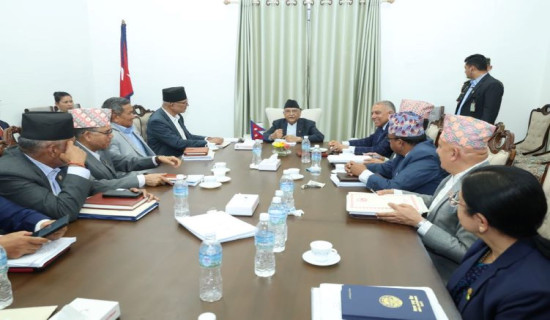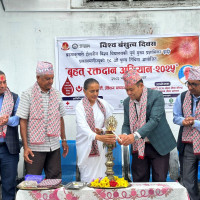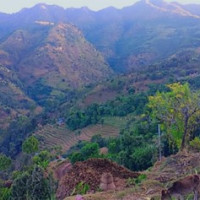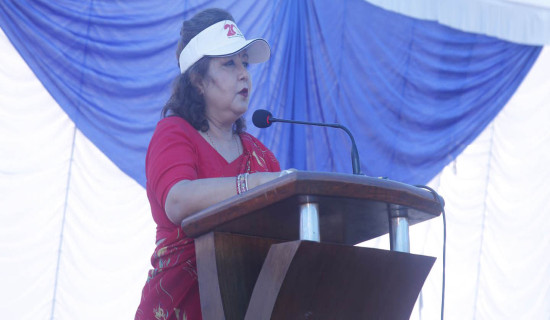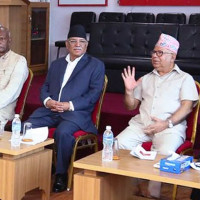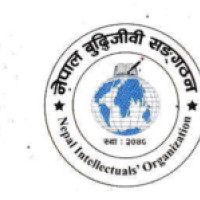- Saturday, 23 August 2025
Revival of 'Bethi' in 40 years brings joy to Dhankuta farmers
By Kabiraj Ghimire,Hile, Aug. 2: This year’s paddy plantation at Yatna Bahadur Katuwal’s farm in Mahalaxmi Municipality-2, Dhankuta, was different. During the monsoon season, it was often difficult to find enough people to plough, level and plant the fields. But this time, there was no such difficulty. Villagers came together with great excitement to help with the work.
Katuwal revived the traditional practice of ‘Bethi’ -- a form of community labour that had almost disappeared. His decision not only made rice planting easier but also brought a festive mood to the village.
People from the whole village gathered, played Naumati Baja (traditional musical instruments), sang folk songs, danced in the muddy fields and planted rice together. The scene was full of excitement and celebration.
Katuwal has been growing paddy in about 55 ropanis of land. On the day of the Bethi, 25 ropanis were planted in just one day, a task that normally takes about a week. He said over 100 people and nine pairs of oxen completed the task.
“Thanks to Bethi, half the field was planted in a single day, and the rest would be done soon after. There was no shortage of workers, and everyone contributed with joy and without expecting anything in return,” Katuwal said.
This was not just in Mahalaxmi; Bethi returned to Dhankuta district for the first time in about 40 years. Along with Katuwal, locals Padam Shrestha and Khoj Bahadur Shrestha also revived the tradition in their fields.
Previously, Bethi was mostly remembered during symbolic events like Asar 15 (National Paddy Planting Day), but farmers had stopped using it in real practice. This year marked a new beginning.
According to Padam Shrestha, the tradition was revived both to bring enthusiasm back to farming and to preserve a vanishing culture, especially as more land is being left uncultivated.
As three Bethis took place in one year, the whole village felt a renewed spirit. Padam Rakhal, Ward Chairperson and a local, said that the locals took part actively in all three events and the whole village was filled with joy.
“This year’s rice planting felt like a festival, not just farm work, because we had Bethis in the village,” said Rakhal.
Durga Puri from Leguwa, Dhankuta, said Bethi helped preserve an old cultural tradition. He believed it could now be a learning experience for the younger generation, who are not familiar with the practice.
Around 40 years ago, Bethi was common among the well-off farmers in Dhankuta and other districts of eastern Nepal. Villagers would gather, play musical instruments, sing folk songs and plant paddy seedlings together. But over time, this tradition became rare.
According to Bhola Nath Ghimire, an elderly resident of Dhankuta Municipality Ward No. 5, rice planting begins in June and continues through July.
However, the joyful traditions of playing Naumati Baja, singing Asare folk tunes and planting in a group have mostly disappeared since around 1983
The end of Bethi has an interesting backstory. In the past, landlords and local leaders (like Mukhiya, Jimwal, Babusahib) would organise Bethi in their fields. But when they started calling villagers to work, demands for wages and benefits began.
As the tradition became associated with serving the wealthy, people started rejecting it. According to Krishna Govinda Dhungana from Kusetar, Sangurigadhi Rural Municipality-3, Bethi was seen as a form of unpaid labour for the rich. As a result, the practice faded away.
Along with Bethi, other customs like building grain storage together, singing traditional songs and playing instruments during farming also disappeared.



